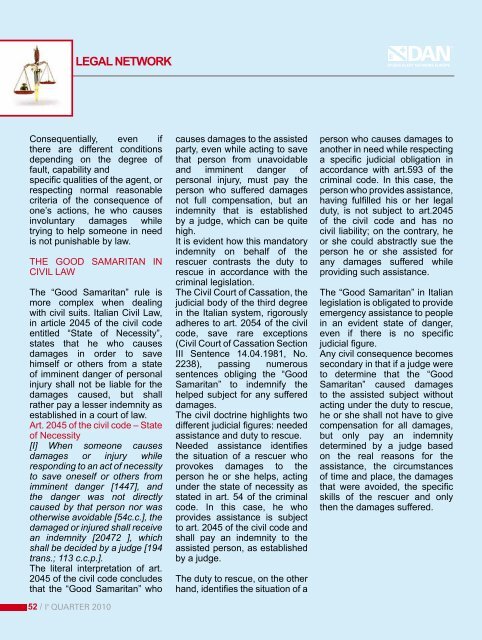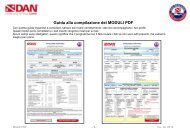Alert Diver - DAN Europe
Alert Diver - DAN Europe
Alert Diver - DAN Europe
Create successful ePaper yourself
Turn your PDF publications into a flip-book with our unique Google optimized e-Paper software.
LEGAL NETWORK<br />
Consequentially, even if<br />
there are different conditions<br />
depending on the degree of<br />
fault, capability and<br />
specific qualities of the agent, or<br />
respecting normal reasonable<br />
criteria of the consequence of<br />
one’s actions, he who causes<br />
involuntary damages while<br />
trying to help someone in need<br />
is not punishable by law.<br />
THE GOOD SAMARITAN IN<br />
CIVIL LAW<br />
The “Good Samaritan” rule is<br />
more complex when dealing<br />
with civil suits. Italian Civil Law,<br />
in article 2045 of the civil code<br />
entitled “State of Necessity”,<br />
states that he who causes<br />
damages in order to save<br />
himself or others from a state<br />
of imminent danger of personal<br />
injury shall not be liable for the<br />
damages caused, but shall<br />
rather pay a lesser indemnity as<br />
established in a court of law.<br />
Art. 2045 of the civil code – State<br />
of Necessity<br />
[I] When someone causes<br />
damages or injury while<br />
responding to an act of necessity<br />
to save oneself or others from<br />
imminent danger [1447], and<br />
the danger was not directly<br />
caused by that person nor was<br />
otherwise avoidable [54c.c.], the<br />
damaged or injured shall receive<br />
an indemnity [20472 ], which<br />
shall be decided by a judge [194<br />
trans.; 113 c.c.p.].<br />
The literal interpretation of art.<br />
2045 of the civil code concludes<br />
that the “Good Samaritan” who<br />
52 /<br />
causes damages to the assisted<br />
party, even while acting to save<br />
that person from unavoidable<br />
and imminent danger of<br />
personal injury, must pay the<br />
person who suffered damages<br />
not full compensation, but an<br />
indemnity that is established<br />
by a judge, which can be quite<br />
high.<br />
It is evident how this mandatory<br />
indemnity on behalf of the<br />
rescuer contrasts the duty to<br />
rescue in accordance with the<br />
criminal legislation.<br />
The Civil Court of Cassation, the<br />
judicial body of the third degree<br />
in the Italian system, rigorously<br />
adheres to art. 2054 of the civil<br />
code, save rare exceptions<br />
(Civil Court of Cassation Section<br />
III Sentence 14.04.1981, No.<br />
2238), passing numerous<br />
sentences obliging the “Good<br />
Samaritan” to indemnify the<br />
helped subject for any suffered<br />
damages.<br />
The civil doctrine highlights two<br />
different judicial figures: needed<br />
assistance and duty to rescue.<br />
Needed assistance identifies<br />
the situation of a rescuer who<br />
provokes damages to the<br />
person he or she helps, acting<br />
under the state of necessity as<br />
stated in art. 54 of the criminal<br />
code. In this case, he who<br />
provides assistance is subject<br />
to art. 2045 of the civil code and<br />
shall pay an indemnity to the<br />
assisted person, as established<br />
by a judge.<br />
The duty to rescue, on the other<br />
hand, identifies the situation of a<br />
person who causes damages to<br />
another in need while respecting<br />
a specific judicial obligation in<br />
accordance with art.593 of the<br />
criminal code. In this case, the<br />
person who provides assistance,<br />
having fulfilled his or her legal<br />
duty, is not subject to art.2045<br />
of the civil code and has no<br />
civil liability; on the contrary, he<br />
or she could abstractly sue the<br />
person he or she assisted for<br />
any damages suffered while<br />
providing such assistance.<br />
The “Good Samaritan” in Italian<br />
legislation is obligated to provide<br />
emergency assistance to people<br />
in an evident state of danger,<br />
even if there is no specific<br />
judicial figure.<br />
Any civil consequence becomes<br />
secondary in that if a judge were<br />
to determine that the “Good<br />
Samaritan” caused damages<br />
to the assisted subject without<br />
acting under the duty to rescue,<br />
he or she shall not have to give<br />
compensation for all damages,<br />
but only pay an indemnity<br />
determined by a judge based<br />
on the real reasons for the<br />
assistance, the circumstances<br />
of time and place, the damages<br />
that were avoided, the specific<br />
skills of the rescuer and only<br />
then the damages suffered.














